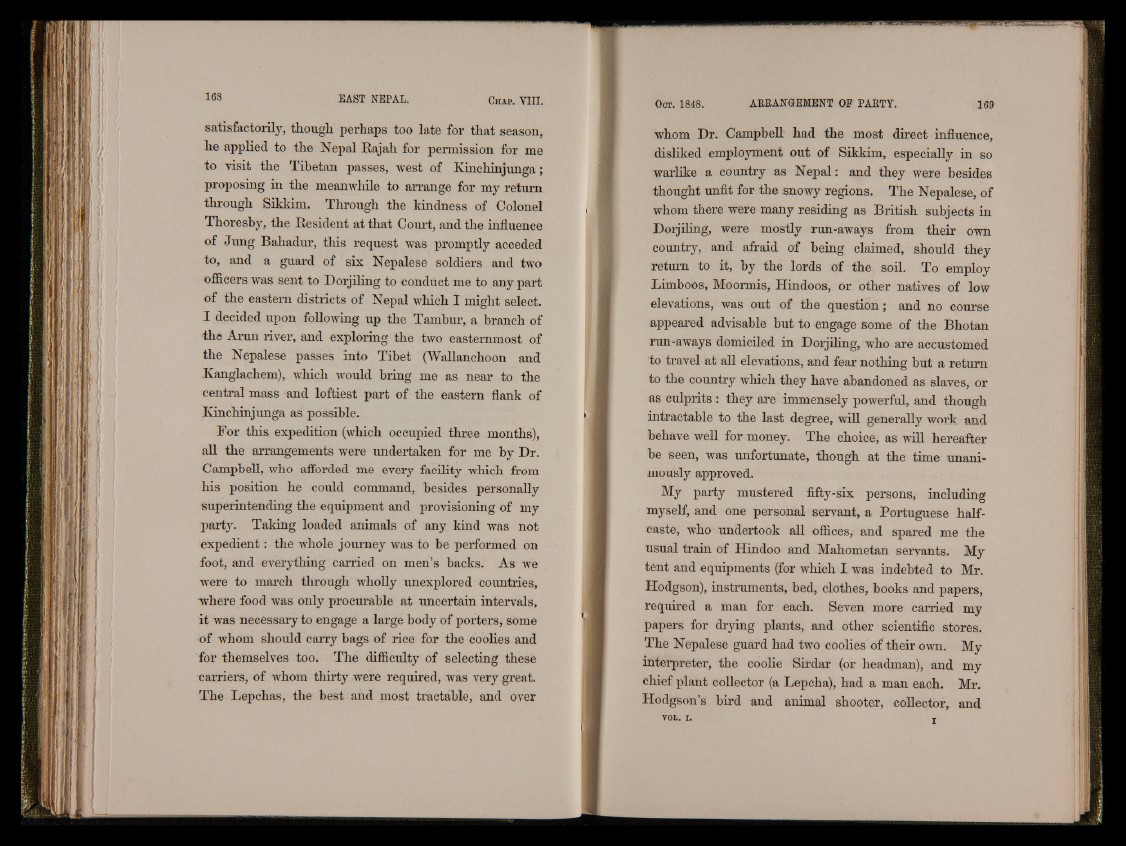
satisfactorily, though perhaps too late for that season,
he applied to the Nepal Rajah for permission for me
to visit the Tibetan passes, west of Kinchinjunga;
proposing in the meanwhile to arrange for my return
through Sikkim. Through the kindness of Colonel
Thoresby, the Resident at that Court, and the influence
of Jung Bahadur, this request was promptly acceded
to, and a guard of six Nepalese soldiers and two
officers was sent to Dorjiling to conduct me to any part
of the eastern districts of Nepal which I might select.
I decided upon following up the Tambur, a branch of
the Arun river, and exploring the two easternmost of
the Nepalese passes into Tibet (Wallanchoon and
Kanglachem), which would bring me as near to the
central mass and loftiest part of the eastern flank of
Kinchinjunga as possible.
For this expedition (which occupied three months),
all the arrangements were undertaken for me by Dr.
Campbell, who afforded me every facility which from
his position he could command, besides personally
superintending the equipment and provisioning of my
party. Taking loaded animals of any kind was not
expedient: the whole journey was to be performed on
foot, and everything carried on men’s backs. As we
were to march through wholly unexplored countries,
where food was only procurable at uncertain intervals,
it was necessary to engage a large body of porters, some
of whom should carry bags of rice for the coolies and
for themselves too. The difficulty of selecting these
carriers, of whom thirty were required, was very great.
The Lepchas, the best and most tractable, and over
whom Dr. Campbell had the most direct influence,
disliked employment out of Sikkim, especially in so
warlike a country as Nepal: and they were besides
thought unfit for the snowy regions. The Nepalese, of
whom there were many residing as British subjects in
Doijiling, were mostly run-aways from their own
country, and afraid of being claimed, should they
return to it, by the lords of the soil. To employ
Limboos, Moormis, Hindoos, or other natives of low
elevations, was out of the question; and no course
appeared advisable but to engage some of the Bhotan
run-aways domiciled in Dorjiling, who are accustomed
to travel at all elevations, and fear nothing but a return
to the country which they have abandoned as slaves, or
as culprits : they are immensely powerful, and though
intractable to the last degree, will generally work and
behave well for money. The choice, as will hereafter
be seen, was unfortunate, though at the time unanimously
approved.
My party mustered fifty-six persons, including
myself, and one personal servant, a Portuguese half-
caste, who undertook all offices, and spared me the
usual train of Hindoo and Mahometan servants. My
tent and equipments (for which I was indebted to Mr.
Hodgson), instruments, bed, clothes, books and papers,
required a man for each. Seven more carried my
papers for drying plants, and other scientific stores.
The Nepalese guard had two coolies of their own. My
interpreter, the coolie Sirdar (or headman), and my
chief plant collector (a Lepcha), had a man each. Mr.
Hodgson’s bird and animal shooter, collector, and
VOL. I . j